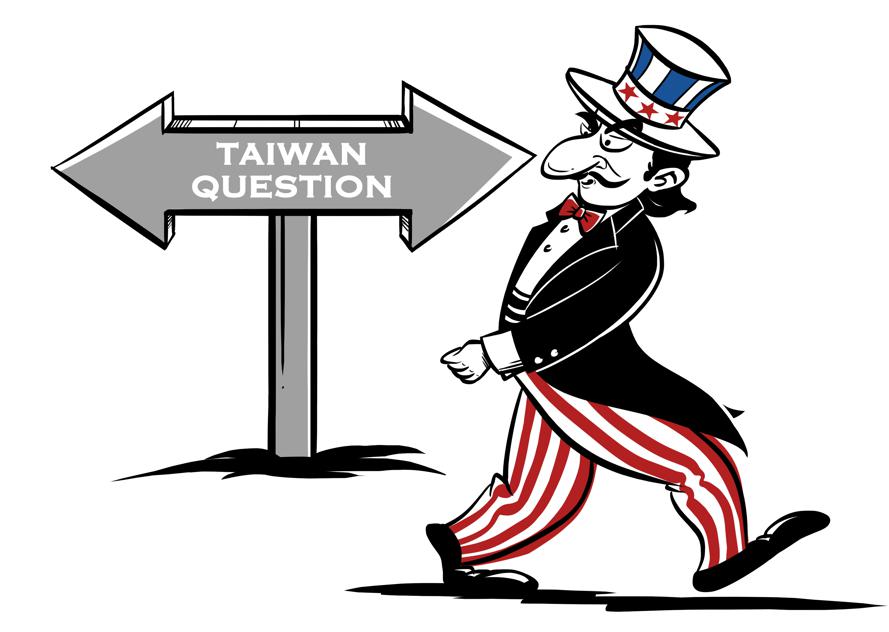Taiwan a risky card for US-led West to play


The recent claim of the United States that its aim is to maintain status quo across the Taiwan Strait, because peace and stability in the region are in its long-term interests is nothing but deception.
No one desires to maintain the status quo of Taiwan being an integral part of China more than the Chinese people. And no one desires to see both sides of the Strait working together to safeguard national peace, sovereignty and territorial integrity more than the Chinese people.
The US, on the other hand, may preach peace, but by playing the "Taiwan card", it is actually drumming up war. Also, some US officials' sensational remarks on the Taiwan question run counter to the goal of maintaining peace in the region.
For instance, CIA Director William Burns claimed in a recent television interview that Washington has intelligence showing that Beijing is preparing for a military attack on Taiwan by 2027. And US think tanks such as the Center for Strategic and International Studies have used simulations which implicitly or explicitly point to the possibility of the Chinese mainland using force to resolve the Taiwan question before 2027.
Besides, US media outlets continuously hype up the notion that the mainland will use military means to resolve the Taiwan question by the 100th anniversary of the founding of the People's Liberation Army, which will be observed on Aug 1, 2027.
These politicians, think tanks and media outlets know full well that their constant machinations to trigger a conflict across the Strait so the US military-industrial complex can make more profit by selling more weapons and military equipment to Taiwan. Recent history tells us that no matter where a conflict breaks out, the US military industry benefits from it.
The US military-industrial complex has become a war monster, wreaking havoc globally. It controls politicians, think tanks and the media through various means, manufactures consent for war, sells weapons and equipment, and profits big time from wars.
Take for instance NATO Secretary General Jens Stoltenberg. His term as NATO chief was recently extended for one more year only because he is known to obey the US and is prone to issuing provocative statements against countries such as China and Russia. And he did exactly that during the just-concluded NATO Summit in Vilnius, Lithuania.
The summit communiqué described China as a threat, and Stoltenberg continued to parrot the US line, saying: "China is increasingly challenging the rules-based international order,
refusing to condemn Russia's war against Ukraine, threatening Taiwan, and carrying out substantial military build-up."
It is not China, but people like Stoltenberg, who do Washington's bidding, are trying to create trouble across the Strait.
Taiwan, in fact, has become one of the biggest cash cows for the US military-industrial complex. And by hyping up the false narrative of a potential mainland attack on Taiwan, the US can smoothly peddle more arms to the island. Although many peace-loving US people often voice their opposition to war, the military-industrial complex continues to lobby politicians, who, in turn, continue to manufacture and disseminate ludicrous narratives to trigger confrontations and conflicts.
The US has been continuously sending the wrong signals to pro-independence forces in Taiwan, in order to escalate tensions across the Strait. The US has been contradicting its own statements and violating international law to undermine the shared political foundation of Sino-US relations by encouraging the pro-independence forces in Taiwan to up their rhetoric and activities.
The US has been engaging in double talk, and distorting, diluting and hollowing out the one-China principle by enhancing official relations with Taiwan, increasing arms sales to the island, and passing Taiwan-related legislation.
Furthermore, some US politicians have been trying to distort the fundamental nature of cross-Strait relations, and labeling the mainland's resolution of achieving national reunification as "aggression". Such actions are nothing but attempts to cross the redline of Sino-US relations.
Encouraged by the US' wrong signals, pro-independence forces on the island have become even more brazen in their actions, although Beijing has made it absolutely clear that separatism is incompatible with peace, and that "Taiwan independence" will inevitably lead to national reunification by force.
If the US genuinely wants peace across the Strait, it should adhere to the one-China principle and refrain from sending any wrong signals to the pro-independence forces in Taiwan.
The author is a professor at the Institute of Taiwan Studies, Beijing Union University.
The views don't necessarily represent those of China Daily.
If you have a specific expertise, or would like to share your thought about our stories, then send us your writings at opinion@chinadaily.com.cn, and comment@chinadaily.com.cn.


































